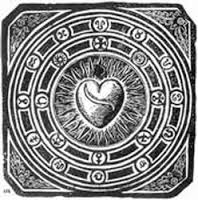Isaque o Sírio — Tratados Místicos
Traduzidos para o inglês por A. J. Wensinck, publicada em 1923
::XXIX::
ON THE DIFFERENT EXCELLENT METHODS OF WISE PROVIDENCE IN EDUCATING PUPILS
All wisdom comes from the Lord, as hath been said. And we exercise ourselves in our own things in order to become wise in the dealings of the Lord with us. The Father of truth which consists in showing always the same face, for the profit of his sons. On the contrary, for the sake of exercise He withdraws his love. Thus He displays in appearance an order such as exists not; but what is, He retains. A wise son recognizes in different attitudes his father’s care for him and his discerning love.
The practice of love appears in two ways when rightly understood: in joyful events, but also in sorrowful ones. This proves that love is constantly tending towards the pleasure of its object. But sometimes it makes its object suffer, because of its fullness; if it makes suffer, it suffers also itself. It resists the motions of natural compassion because of the fear of later harm. Love urges us to participate; knowledge gives strength to resist ( these ) feelings.
Parallel to the differences in its election are the varying forms of wise love regarding those who receive its sustenance. Let us not ask of a wise friend foolish love. He who kills his son by feeding him with honey, is not different from him that kills his son with a knife.
It is namely not worthy of the wisdom of love to sustain its object in a uniform way, the same in health as in illness. That is to say the variations which depend upon the will in the choice of the emotions, not bodily changes. If we are able to choose those ( varying ) times when we love some one, with discrimination, especially when such a one is under our command, is it not then but right that we attribute to God the faculty of performing the offices of his discriminating love unto us, even if we do consider them in the same way as the variations we are able to show to our friends? This is difficult to bear, as I know myself; but it is profitable nevertheless. Thy nature which is liable to deviation makes thee in need of this, if not as a retribution for what has passed, then to excite in thee fear of what will certainly happen.
Distressing accidents are to the inner education what wholesome medicines are to bodily disparity.
All that is simple among creatures, is without struggle in its dealings; this is applicable to bodily as well as to non-bodily beings. Action is of such a nature that it is only possible in connection with disparity. Disparity exists only in composite beings, on account of a united duality. And though non-composite and simple beings are also said to be liable to aberration still this takes place wholly to the right side, and not in the way of action, because they have no experience of that which is on the opposite side. They are only affectable regarding the good. For their liability to deviation is checked by swift love; and where there is love, there is no struggle and no fear. Yet they are bound in nature; and from this being bound, their liability to aberration is said to originate.
Good and evil are the offspring of freedom. Where the latter is lacking, to practise the former is superfluous with respect to remuneration. For nature knows no remuneration. Reward is decreed for strife. There can be no mention of victory where there is no struggle. When opposition is removed, freedom vanishes at the same time. Then nature remains without strife. A time is reserved for the annihilation of freedom; then a limited rationality comes into existence, among men as well as among the angels. Rationality, not sensible emotionality. In conception rationality possesses two peculiarities, namely two forces, a rational and a conceiving force. The former is altogether limited. In the latter nature is complete, in so far as it is conceiving. But again it is limited, not compulsorily, nit rather delightfully, with a delightful bond. Sometimes this delight ) happens unto a few in this world in a symbolical way; nit only in trance. Unto the primeval rational beings ( this happened ) without trance, as far as this was possible, though hey were not perfect. What was it which happened without ranee unto persons who were not perfect? There are mysteries hat cannot be received before the time appointed. Those per-ons are imperfect therefore, who do not possess it at all, not hose who possess what they do here possess, only in trance. Therefore constancy ( is necessary ), rather than trance. If trance ( at all ), then it is for those things which are most excellent. So trance for those people was an excellent change; with us it is annihilation, because of the sickness of the flesh.
PÁGINAS: toc
{backlinks info=”hits”}
